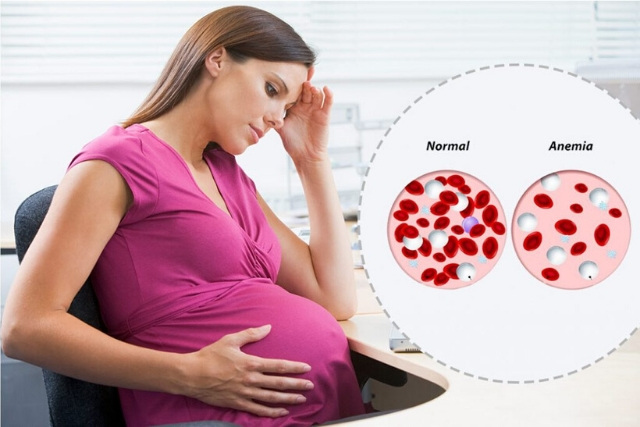Anemia in pregnant women is a common problem. A mild condition of anemia is no cause for anxiety and is easily treatable when detected at an early stage. However, if left untreated, it may prove dangerous for both the mother and baby.
In this article:
A Guide for Anemia During Pregnancy
Types of Anaemia During Pregnancy
Causes of Anaemia During Pregnancy
Effect On the Baby
Risk Factors
Symptoms of Anaemia During Pregnancy
Tests for Anemia During Pregnancy
Treatment for Anaemia During Pregnancy
Prevention of Anaemia During Pregnancy
All You Need to Know About Anemia During Pregnancy
Anemia is a medical condition when the total amount of red blood cells or hemoglobin decreases in the body. As a result, in pregnant women, the body doesn’t have enough red blood cells to carry the required oxygen to the tissues and the fetus. Besides other nutrients, an expectant mother requires a diet rich in iron, folate and vitamin B12 to produce more blood for the growth and nourishment of the baby. When the dietary requirement isn’t met, it can lead to anemia.
Pregnant women are more susceptible to anemia because the body produces more blood than usual. This requires extra iron, folate and vitamin B12 to produce substantial amounts of healthy red blood cells and hemoglobin. Take care of diet otherwise, it may end up with a deficiency.
Types of Anemia During Pregnancy
The most common types of anemia found in pregnant women are –
- Iron-deficiency anemia
- Folate-deficiency anemia
- Vitamin B12 deficiency
Causes of Anemia During Pregnancy
The following are the causes which lead to anemia –
- The woman is pregnant with more than one baby
- The pregnant woman vomits excessively due to morning sickness
- The woman has been anemic even before conceiving
- The expectant mother doesn’t eat a diet rich in iron, folate, and vitamin B12
- There are two pregnancies close together
- A teenager becomes pregnant
Effect On the Baby
The baby can be anemic. Preterm and low-birth babies are the major effects on the baby. Other effects are neural tube defects or birth defects in the brain or spine. The baby can also have developmental delays in the child.
Risk Factors
5 most common risk factors which can’t be ignored are –
- Pregnant with multiples
- Have two or more pregnancies in quick succession
- Aren’t eating enough foods rich in iron
- Experienced heavy periods before becoming pregnant
- Are routinely vomiting as a result of morning sickness
Symptoms of Anemia During Pregnancy
In mild cases of anemia, one may not show any symptoms. However, as it grows severe, the followings symptoms are most commonly seen –
- Dizziness
- Fatigue and weakness
- Shortness of breath
- Pale complexion
- Rapid or irregular heartbeat
- Chest pain
- Cold hands and feet
- Trouble concentrating or irritation
Initially, the symptoms of anemia during pregnancy may be mild, however, there is a risk of ignoring them. With time, the symptoms may worsen and will have to be treated so as to not lead to complications later. Immediately consult the doctor if there are any symptoms.
These symptoms are generally controlled with dietary supplements like iron tablets, folic acid, and vitamin B12 supplements. Remember, some amount of fatigue and weakness is unavoidable and also normal due to the growing fetus in the body. Do not panic, the doctor will guide the best.
Tests for Anemia During Pregnancy
During the course of pregnancy, the doctor will periodically monitor the chances of anemia. Blood tests are conducted not only during the first trimester but also in the second and third. This is done to rule out the possibility of anemia in the later stages of pregnancy too. The following blood tests are carried out to diagnose anemia –
- Hemoglobin test – this test is carried out to measure the amount of hemoglobin in the body.
- Hemotocrit test – the purpose of this test is to measure the percentage of red blood cells in the blood.
Treatment for Anemia During Pregnancy
The doctor may prescribe the following supplements to treat anemia during pregnancy –
- Iron and folic acid – this is to ensure that the required amount of iron and folate is maintained in the body. Advice is to increase the intake of iron and folate-rich foods.
- Vitamin B12 – recommend vitamin B12 supplements in addition to foods like meat, dairy products, and eggs to help tackle vitamin B12 deficiency.
Prevention of Anemia During Pregnancy
Prevention of anemia in pregnancy must be of utmost importance for all expectant mothers. Get a healthy diet and ensure to include iron-rich foods such as –
- Dark green, leafy vegetables like spinach, kale, and broccoli
- Beans, lentils, tofu
- Lean red meat, poultry
- Fish
- Nuts and seeds
- Eggs
- Cereals and grains
Remember vitamin C helps the body to absorb iron better. So, whenever looking to eat iron-rich food, also include foods like citrus fruits, tomatoes, kiwi, strawberries and bell peppers which are rich in vitamin C.
Conclusion
All expectant mothers should consciously avoid any deficiency in the body during pregnancy. Moreover, anemia during pregnancy third trimester should strictly not be ignored. Consult the doctor if the symptoms of anemia persist for along time and the treatment done.
Refrences
https://www.webmd.com/baby/guide/anemia-in-pregnancy#1
